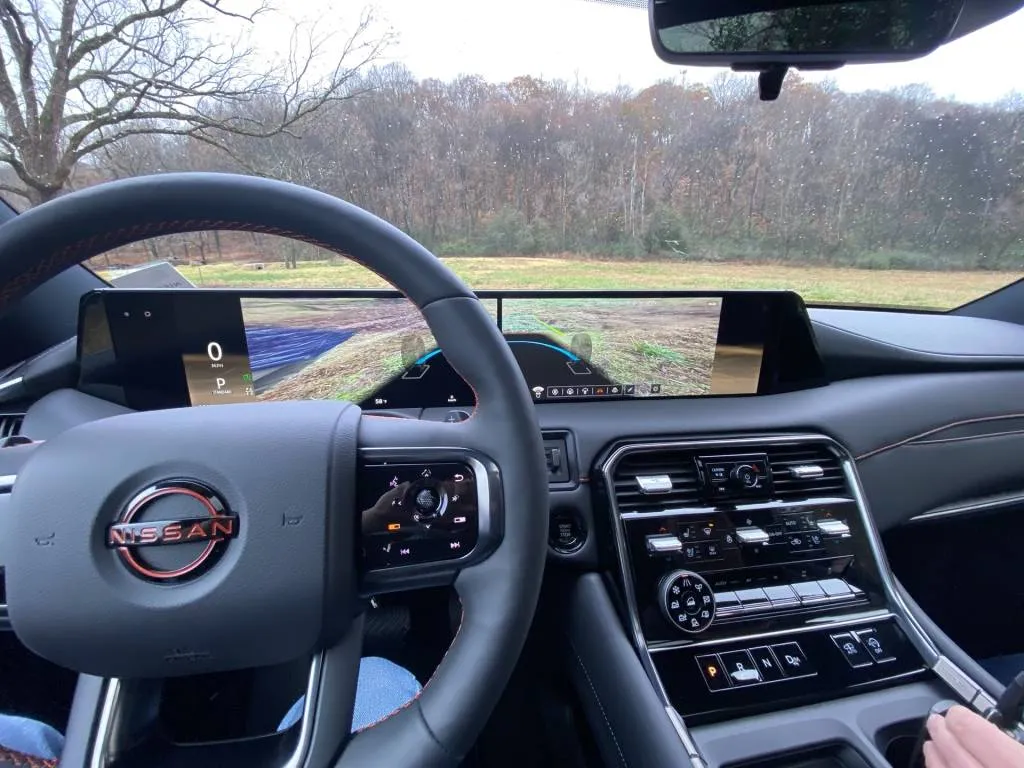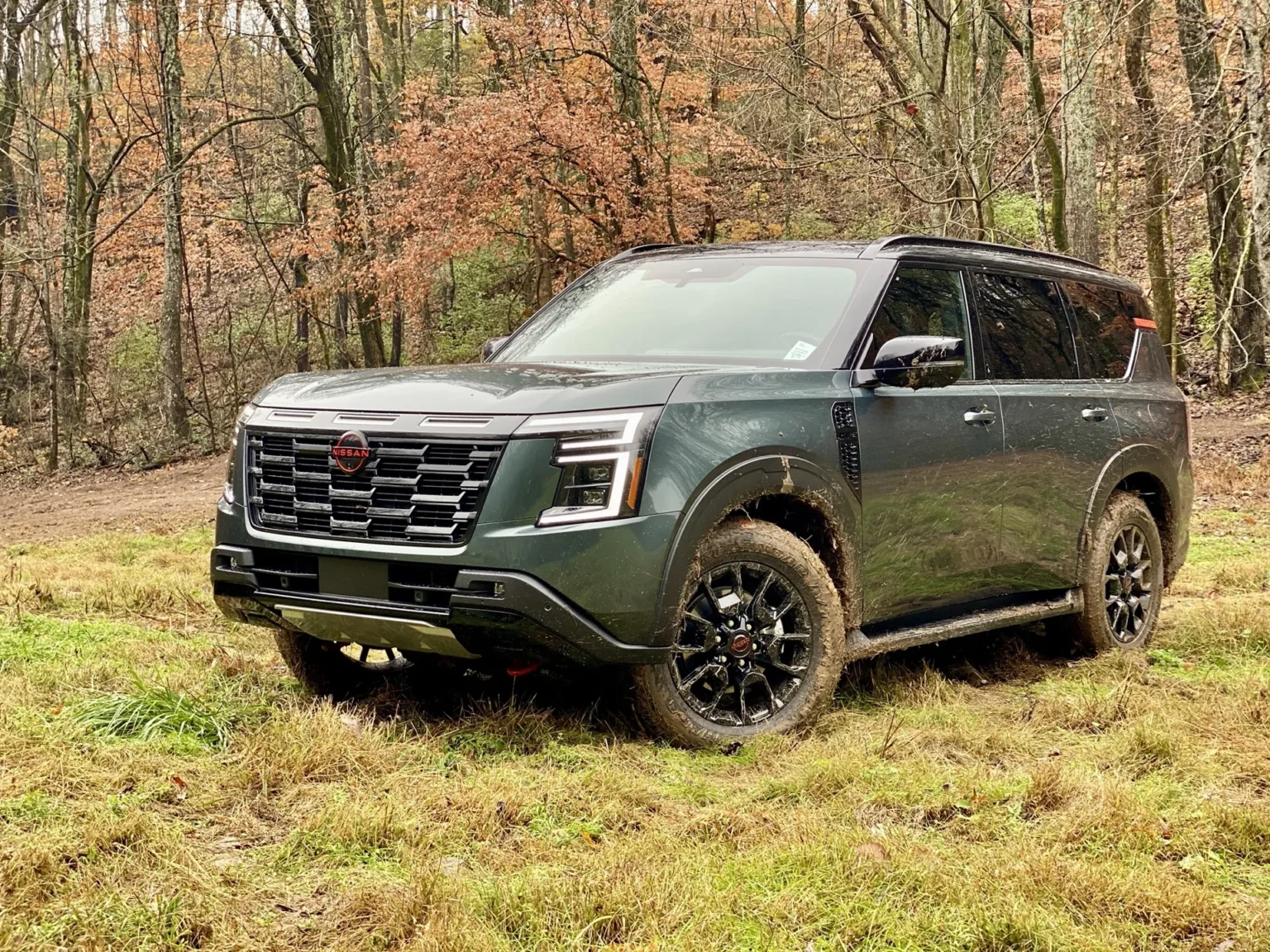- Armada Pro-4X comes with an air suspension, a locking rear differential, skid plates, and all-terrain tires
- That gear might not be enough get the full-size SUV through the muckiest Midwestern mud
- The twin-turbo V-6 that replaces the V-8 is a solid engine
The mud could swallow the boot off of your foot. Two days of cold winter rain turned the shallows of a hilly forest into a bog. Add in a floor of decomposing oak and maple leaves and there was more grip to be had up the trees than on the ground. Deep in the woods outside of Nissan USA’s headquarters in Franklin, Tenn., I tested the new Pro-4X trim ported from the Frontier midsize pickup truck to the redesigned 2025 Armada. The mud had other ideas.
Midwestern folk know what off-roaders know: this kind of sole-sucking mud can only be countered with momentum. Stop on an ascent, or stay in the ruts, and the muck will continue to envelop the tires until the treads have less texture than pores.
On the rutted path out to the mud course, this longer (0.7 inch), wider (3.4 inches), taller (ground clearance raises from 9.1 to 9.6 inches) redesigned Armada made its presence known. With four-wheel drive engaged and in Mud/Rut mode, the full-size SUV had more lateral slide than a bad wedding dance. Fun enough, if you’re drinking the cocktails.
2025 Nissan Armada Pro-4X
Even if you’re not, and you’re new to off-roading, Nissan equips the Pro-4X with enough gear to simplify it. With the rear locker engaged (standard on Pro-4X), it neutralized the slipping and sliding of the heavy Armada. The Pro-4X also has Snow, Sand, and Rock mode to join the four other modes standard on every Armada. It also has an air suspension inside its double wishbones front and rear to lift the body 2.0 inches from the standard 9.6 inches, or lowers it the same amount for loading. In any of the off-road modes except for Rock, it’s at the three out of four setting, at about 10.6 inches of body lift, then Rock is at the max of about 11.6 inches. When cruising it’s at the two out of four default setting.
The raised front bumper on Pro-4X increases the approach angle from 23.5 to 34 degrees. For the logs and other spiky goblins lurking in the muck, skid plates protected the radiator, 2-speed transfer case, and the fuel tank. During the narrow part of the trail, where giant oak trees dwarfed the Armada and its greedy branches threatened to scrape the pretty Gun Metallic coat, I clicked on the side camera views in Nissan’s new display setup to negotiate the hazards.

2025 Nissan Armada Pro-4X
The new surround-view camera system might be one of the cooler features of the Pro-4X and the two Platinum grades. On those models, the standard 12.3-inch digital gauge cluster that connects with a 12.3-inch touchscreen upgrade to 14.3 inches for each. Some of the views from the eight cameras get projected all the way across the full 28.6 inches of screen real estate, such as the wide-angle 170 degree view from the front. An invisible hood view lets you see the rocks and other debris under the front axle; side mirror cameras project what’s on both sides; bird’s-eye projections give a full sweep of what’s around. All this extra vision removed many of the unknowns that can be the most intimidating thing about off-roading.
Nissan took us out on a flat area to slalom past hay bales and drive on wood beams over a shallow pit, all with a cover over the windshield so we were blinded except for the screens.
It was eye-opening. Then, the troubles.
The intersection of the rutted path from the camera demo to the climb had already turned into mud soup, so I stuck to a higher narrow line out of the mud into the grass to queue up for the uphill part. Some of my colleagues waited in the muck. This is a 6,054-pound SUV. I put it in neutral, shifted the two-speed transfer case into 4-Low, put it into drive and rolled a little until it locked into place. Then I waited.
Up through the trees and to the left, the lead Armada made it up fine. The second one got stuck. On an ascent. In deep ruts. It slid back. A tree pushed back. It was too narrow to link up the two tow hooks standard on the Pro-4X. Side-by-sides and chainsaws were summoned. Maybe the lead driver didn’t leave enough of a berth for the second driver to keep momentum. Maybe the Yokohama Geolander all-terrain tires wrapped on the 20-inch wheels weren’t the right tires for the muck. Maybe the driver was unfamiliar with muck. Maybe it was neither or more. Would the Frontier Pro-4X have made it? Would other off-road SUVs?
It doesn’t matter. The woods had spoken. I clomped away in my muddy boots confident enough in the Armada Pro-4X off-roadability, to a point.
I was reminded of the GMC Hummer EV SUV program in March 2023, when the phrase “atmospheric river” entered everyday language. The deluge in California’s wine country, after two decades of drought and on top of ash sediment from the previous season’s fires, turned the earth into mashed potatoes. Even with far more sophisticated technology, ranging from rear-axle steering that enables Crab Walk to an air suspension that lifted the ground clearance to 15.9 inches, the 9,000-pound SUV couldn’t do it. That program was redone a year later in the arid southwest, where the Hummer EV SUV proved to be king of the off-road hill.
The third-generation Armada, which looks nearly identical to the Nissan Patrol sold globally as Nissan’s longest running nameplate, does not have the same ambitions as the world-conquering Hummer EV. At $75,750 for the Pro-4X, or $30,000 less than the Hummer EV SUV I tested, it shouldn’t. The point here is that the earth is smarter, stronger, and more dangerous than our best intentions, and some days are best left for the couch.
Towing in the 2025 Nissan Armada
Yes, Nissan downsized the engine from the old 5.6-liter V-8 to a new twin-turbocharged 3.5-liter V-6 evolved, in Nissan’s words, from the GT-R supercar. It’s more powerful, making 425 hp and 516 lb-ft of torque, up 25 hp and 103 lb-ft. It’s paired with a more efficient 9-speed automatic transmission (from a 7-speed). Yet the max towing capacity remains the same at 8,500 pounds.
The powertrain worked well towing an Airstream trailer that weighed about 6,000 pounds and was taller and wider than its locomotive. There was no juddering or porpoising, and no visible sag from outside. There was a little sway getting up to highway speed off the ramp, but it settled in nicely once cruising. Pro-4X models get a standard trailer brake controller. Every Armada comes with a Class IV tow hitch and 7-pin wiring harness.
2025 Nissan Armada
2025 Nissan Armada
2025 Nissan Armada
2025 Nissan Armada
With the available air suspension, the rear will lower until the weight of the trailer is on the tongue, then it raises to its standard ride height and you can set the bars and enter the trailer profile into the instrument cluster. A trailer light check feature on the fob lets one person hop out back and make sure the trailer brake lights and indicators are functioning, so you don’t need to back it up to a reflective wall or ask someone else for help.
It doesn’t have all the camera angles of GM trucks or SUVs, nor does it have the Ford trailer control feature that makes hitching a trailer easy even for the uninitiated. Standard side mirrors limited rear visibility, and it seems Nissan could add another rear camera angle to see beyond long trailers. Still, the system is a thoroughly modern improvement.
On-roading in the 2025 Nissan Armada
The new Nissan Armada has a smaller, stronger engine, a stiffer, better chassis, an available air suspension, and overall a quieter, more stable ride. I like this powertrain, which is also used in the Infiniti QX80 but with premium fuel. It runs quieter, jumps off the line quicker, feels quicker to 60 mph, and the 9-speed is more responsive to throttle inputs. In Sport mode it can be a little jerky, but in Normal and Eco mode it was a smooth operator. The expected 17 mpg with four-wheel drive—2 mpg better than the outgoing V-8—is a nice bonus.
Platinum and Pro-4X models I tested didn’t sound or ride like a full-size SUV, but I didn’t test the base SV or mid-level SL with the steel spring suspension. Nissan says the new frame has 25% greater torsional rigidity and 57% more lateral stiffness than the outgoing Armada. There was body lean typical for such a large, high-riding vehicle, but it never felt tippy.
Every Armada comes with a laminated front windshield, and plenty of sound deadening. Sport mode let in engine noise, and the portly side mirrors added wind noise at highway speeds, but overall the cabin was chill.
2025 Nissan Armada, left, 1967 Nissan Patrol, right
The best thing about the 2025 Nissan Armada: $58,530
Including a $2,010 destination fee, the 2025 Nissan Armada SV costs nearly $2,000 less than the 2025 Chevy Tahoe, and nearly $6,000 less than the 2025 Toyota Sequoia. It comes with the expected driver-assist tech, including adaptive cruise control, and has power front seats and the 12.3-inch digital instrument cluster running beside a 12.3-inch touchscreen with wireless smartphone connectivity. Like the Tahoe, four-wheel drive adds $3,000.
It’s a good deal, and that’s no mucking around.
Nissan paid for airfare and lodging for Motor Authority to muck around in Tennessee.
Read the full article here

